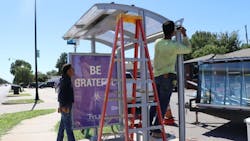The Oklahoma City Council approved the MAPS 4 Implementation Plan on Sept. 14. The plan will serve as the guiding document for the program scope, project scheduling and budgets of the temporary penny sales tax measure voters approved in December 2019.
The MAPS program was first approved by voters in 1993 and has funded more than $1.8 billion worth of civic projects in the Oklahoma City area. This fourth iteration of the MAPS program is projected to raise $978 million from the sales tax over an eight-year period. It will fund 16 major projects and designates $87 million for transit-specific improvements.
“The development of this MAPS 4 implementation plan has taken about the same amount of time as the MAPS 3 plan and so, above all, I am grateful to everyone involved for keeping us on pace, even in the face of the challenging year and a half that we’ve experienced,” said Oklahoma City Mayor David Holt. “I want to especially thank the MAPS 4 Citizens Advisory Board for its role in this process and its recommendation."
The city describes the program schedule as aggressive, with almost all 16 projects moving forward within 15 months of plan adoption.
“Determining where in the schedule to place each project largely depends on operational capacity and availability of funds,” said MAPS Program Manager David E. Todd. “Because the sales taxes are collected over an eight-year period, the full $978 million is not available to start construction on every project right away. With careful planning and financial modeling, the program schedule presents a balanced approach with early movement on most projects.”
By March 2023, $110.5 million in operating/maintenance and capital improvement funds included in the program will be transferred to the MAPS 4 Investment and Operating Trust to allow ample time for the investment funds to grow.
“The operation and maintenance of all projects will ultimately become the responsibility of others,” said Todd. “The schedule provides time for some operators to accomplish necessary organizational growth and other preparations prior to the completion of construction. Other project operators will benefit from early phasing to avoid delays and secure events that support Oklahoma City economic activity.”
An 11-member MAPS 4 Citizens Advisory Board oversees the program and submits associated recommendations to City Council. Six resident subcommittees will oversee one or more of the 16 projects and provide recommendations to the MAPS 4 Citizens Advisory Board. The six subcommittees include Civil Rights Center, Community, Connectivity (where transit projects fall), Innovation District, Neighborhoods and Venues.
The transit components of the MAPS 4 initiative include $5 million for planned growth, $10 million for bus stop improvements, $60 million for advanced transit and $12 million for enhanced bus service.
According to the implementation plan, items included in the planned growth component of the transit project will occur early in the program, as will improvements to existing bus stops. Initiatives included in the advanced transit package will begin near the middle of the program, which will allow EMBARK to build operational capacity necessary to support these improvements.
The MAPS 4 Implementation Plan and the MAPS 4 Program Schedule is available at okc.gov/maps4.

Mischa Wanek-Libman | Group Editorial Director
Mischa Wanek-Libman is director of communications with Transdev North America. She has more than 20 years of experience working in the transportation industry covering construction projects, engineering challenges, transit and rail operations and best practices.
Wanek-Libman has held top editorial positions at freight rail and public transportation business-to-business publications including as editor-in-chief and editorial director of Mass Transit from 2018-2024. She has been recognized for editorial excellence through her individual work, as well as for collaborative content.
She is an active member of the American Public Transportation Association's Marketing and Communications Committee and served 14 years as a Board Observer on the National Railroad Construction and Maintenance Association (NRC) Board of Directors.
She is a graduate of Drake University in Des Moines, Iowa, where she earned a Bachelor of Arts degree in Journalism and Mass Communication.






